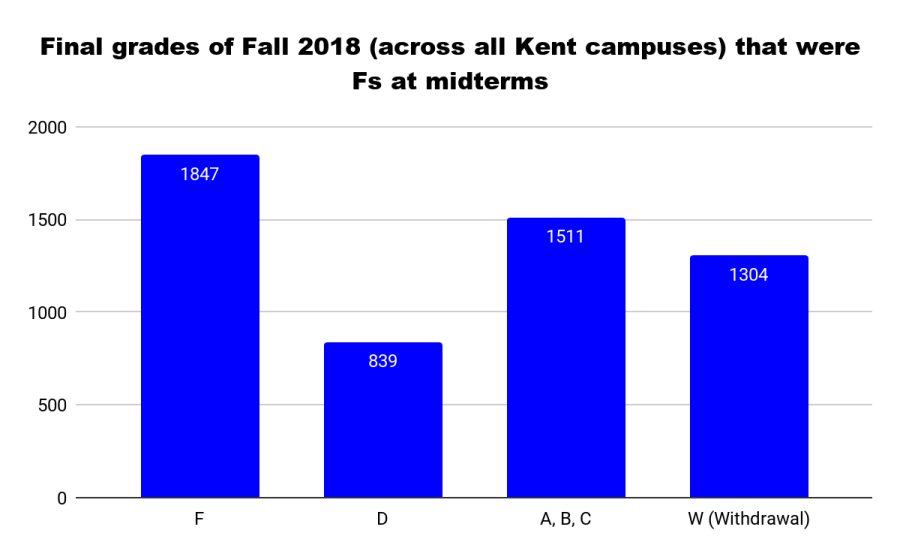Failing grade at midterms? Kent students have options
Students with an F or any grade below what they’d hoped for at midterms can find themselves panicking and wanting to withdraw before the 10-week withdrawal deadline to save their GPA, but there are other options to consider before resorting to a withdrawal.
The first step in potentially improving that grade is talking to an adviser. In fact, an adviser sometimes reaches out to the student first. When the advising office in the College of Arts and Sciences detects that a student has a grade below a C-, they send an email asking to speak to them as soon as possible.
While the knee-jerk reaction to seeing the intimidating letter F on Blackboard can be to withdraw from the course and try it again another semester, considering every option can end up saving students time and money.
Because of how complicated the concept of withdrawing is and how much stress it can cause students, academic advisers encourage students to look at things positively and not give up before they have found the best solution for them.
“The adviser always needs to present a positive attitude to the student and let them know that they have options,” said Mandy Anderson, director of academic advising for the College of Arts and Sciences.
However, positivity isn’t a foolproof problem solver. Anderson said students need to consider everything that is pulling them from their studies.
Every conflict a student faces can contribute to poor academic performance. Problems range from students failing to understand the testing style of the course to going home every weekend and not doing schoolwork while there.
Another potential next step for students is going to the Save My Semester Workshop. The workshop is designed to help students set realistic goals, identify resources and learn new study strategies.
The workshop is available to all students but is primarily tailored to first-year students. The workshop’s final session will be Thursday and can be signed up for online. For students unable to make that date, Student Success Programs coordinator Cody Holland suggests talking to the most important person involved in determining a student’s grade: the professor.
“The professor in that class that you’re struggling in is going to have the best option coming forward,” Holland said. “Whether that’s extra credit, or makeup work, or a, ‘Hey, you know, I’ll give you an extension.’”
Data from a 2017 survey suggests the workshop is effective. Of the students who used the workshop and filled out the survey, 96 percent said they planned to use strategies they learned to establish new habits or behaviors.
While data suggests the workshop is succeeding in its goal at Kent State, conditions seem different when looking at all of Kent’s campuses combined.
In the Fall 2018 semester, 5,501 Fs were earned at midterms across all Kent State campuses. 1,304 (24 percent) of these Fs ended up as a W, meaning the student dropped the class.
“Of those 4,197 courses that were completed, 36 percent had A, B or C as a final grade, 20 percent had a D and 44 percent finished with an F,” wrote Wayne Schneider, director of Institutional Research, in an email.
Students have options to improve upon a poor midterm grade, as the data from the fall 2018 semester shows that over 2,000 students ended up passing the classes they received an F midterm grade in.
Connor Everett covers recruiting and retention. Contact him at [email protected].



